Do you feel watched? Do you suspect there is a hidden tracking device in your car? If so, this article is for you. Through the right training and tools, you can learn how to effectively detect a GPS tracker. At ESPIAMOS, we always recommend that our clients acquire the skills to perform these tasks themselves, offering the best courses and products specialized in electronic countermeasures. Keep reading and find out how to protect your privacy!

Table of Contents
- Introduction to Detecting a Hidden GPS Tracker
- Understanding Hidden GPS Trackers
- Types of Spy GPS Trackers
- Installation Places for a Spy GPS Tracker
- Methods to Detect a Hidden GPS Tracker
- Steps to Follow After Detecting a Hidden GPS Tracker
- WE SPY: Your Ally in Detecting Hidden GPS Devices
- The Importance of Prevention in GPS Tracker Detection
- FAQ: Frequently Asked Questions about GPS Tracker Detection
- Conclusion: Prevention and Technology at the Service of Your Privacy
Introduction to Hidden GPS Tracker Detection
In the information age, detecting a hidden GPS tracker in your car can be crucial to maintaining your privacy. We live in an increasingly connected world, where technology is used for both legitimate and illegitimate purposes. The exact location of a car can be tracked in real time thanks to hidden GPS trackers, small and discreet devices that can be installed in different parts of a vehicle.
While these devices can have legitimate uses, such as tracking vehicle fleets or recovering stolen cars, they can also be used for malicious purposes, such as spying or stalking. In this article, we will explore how you can detect a hidden GPS tracker in your car, what steps to take if you find one, and how ESPIAMOS training can help you protect your privacy.
ESPIAMOS stands out not only for the sale of security and counter-surveillance products, but also for its training approach. Through our TSCM (Electronic Countermeasures Techniques) courses, we teach our clients to identify and counter electronic threats such as GPS trackers. Education is key to being prepared in a world where technology is constantly evolving.
Understanding Hidden GPS Trackers
A hidden GPS tracker is a device that allows the exact location of a vehicle to be tracked in real time. These devices are usually very small, sometimes the size of a matchbox, and can be installed in various parts of the car without the owner noticing. Their discreetness is what makes them a potential threat to privacy.
What is a Hidden GPS Tracker?
A GPS tracker is a tracking device that uses the Global Positioning System (GPS) to determine the precise location of an object or vehicle. Hidden GPS trackers are specifically designed to be discreetly placed in a car, allowing someone to track its movements without the owner's knowledge.
These devices can be used for a variety of purposes, such as tracking fleets of vehicles, recovering stolen vehicles, or in some cases,sos, malicious activities such as stalking. It is essential to learn how to detect them, not only to ensure your privacy, but also to prevent possible threats to your personal security.
Fundamental Parts of a GPS Tracker
To detect a GPS tracker, it is crucial to understand how they work and what their essential components are. Generally, a GPS tracker consists of two main parts:
- GPS Antenna: It can be internal or external and is responsible for capturing the signals from the GPS satellites to determine the exact position of the vehicle.
- GSM/GPRS Modem: It sends the vehicle's position to a tracking platform or a monitor phone at regular intervals. These devices send data in "bursts" at intervals of 10 to 60 seconds, depending on their settings.
Some advanced GPS trackers may include additional features, such as the ability to communicate using 3G, 4G, WiFi, or Bluetooth networks. To effectively detect a hidden GPS tracker, it is essential to know the frequencies on which these devices operate.
What frequencies does a GPS tracker work with?
GPS trackers typically operate on several frequencies, depending on their design and functionality. Most use the L band of the radio frequency spectrum, which is reserved for satellite navigation. The main frequencies in this band are:
- L1 (1575.42 MHz): The most common frequency used by the GPS system to provide positioning data.
- L2 (1227.60 MHz): Used by more advanced GPS systems to improve accuracy, especially in environments where the signal can be interfered with, such as in cities with tall buildings.
- L5 (1176.45 MHz): A more modern frequency that offers greater accuracy and reliability, but is not yet as widespread as L1 and L2.
In addition to GPS frequencies, many trackers use cellular networks to transmit tracking information. These networks are usually 2G, 3G, or even 4G, depending on the device. Here's a rundown of the most common frequencies:
- 2G/GSM Europe: 900 and 1800 MHz
- 2G/Americas: 850 and 1900 MHz
- 3G/WCDMA: 2100 MHz
- 4G/LTE: 1800 and 2600 MHz
- WiFi and Bluetooth: 2400 MHz
By knowing the frequencies these devices operate on, you can use specialized tools, such as frequency detectors, to find them. Proper training in the use of these tools is crucial to improve the chances of successful detection.
Types of Spy GPS Trackers
There are many types of spy GPS trackers on the market, each with its own features and capabilities. However, they can generally be classified into two large groups:
GPS Trackers with Installation
These devices require connection to the vehicle's electrical system to operate. Because they are integrated with the car, they are more difficult to detect and can offer continuous surveillance thanks to the power provided by the vehicle itself. However, their installation is usually more complicated and, in many cases, requires professional intervention.
GPS Trackers without Installation
Also known as portable or "throw-and-go" trackers, these devices operate independently, powered by internal batteries. They can be placed in different parts of the vehicle without needing to be connected to the electrical system, making them easy to move and install. However, battery life is a limitation, as these devices must be recharged or replaced regularly.
Installation Places for a Spy GPS Locator
To detect a hidden GPS locator, it is important to know where they are usually placed. The devices can be installed both inside and outside the vehicle, which can make them difficult to locate. Below are some of the most common locations:
Inside the Vehicle
Inside, GPS trackers can be placed in places such as:
- Under the vehiclethe seats.
- In the air vents.
- In the glove compartment.
- Integrated into the interior ceiling or even into the car's electronic systems.
Exterior of the Vehicle
The exterior of the car offers places such as:
- Bumpers.
- Under the car, attached to the chassis.
- Next to the car battery.
These places are ideal for installing tracking devices due to the good reception of the GPS signal and their relative discretion. However, a detailed visual inspection can help you identify a hidden GPS tracker.
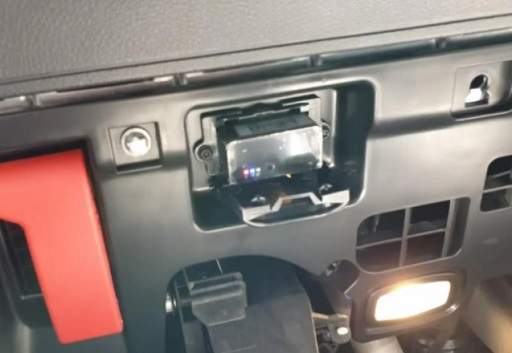
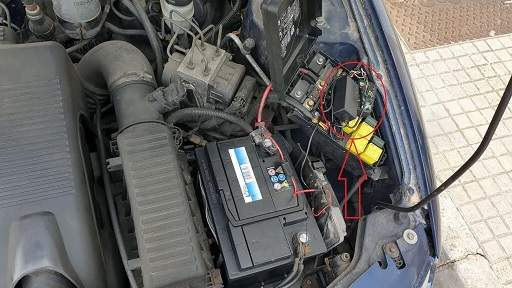
GPS tracker hidden in the engine
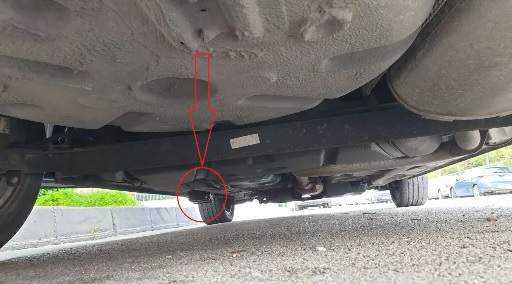
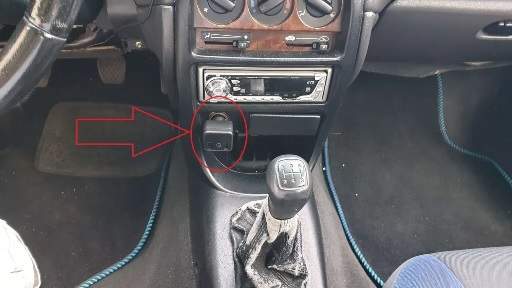
GPS tracker hidden in an everyday object
Methods to Detect a Hidden GPS Locator in Your Car
If you suspect that someone has placed a hidden GPS locator in your car, there are several methods you can use to search for and find these devices. Below, we explain some of the most effective techniques. It is important to mention that at ESPIAMOS we always prefer to train our clients, teaching them how to use these tools themselves rather than simply performing the service. Our philosophy is: "teach them to fish, don't give them the fish."
Visual Inspection of the Vehicle
The first step in finding a hidden GPS tracker is to perform a detailed visual inspection. Although it may seem obvious, many GPS trackers can be placed in easily accessible and visible places if examined carefully.
Check the most common places inside and outside the car, such as:
- Under the seats and in interior compartments.
- In the glove box and other storage compartments.
- Under the dashboard.
- In the bumpers, fenders, or on the underside of the car.
Many GPS trackersGPS trackers are designed to be discreet and difficult to detect with the naked eye. However, some devices may be visible on connectors such as the OBD (on-board diagnostic system) port. Keep in mind that some trackers may appear to be part of the car's system, making them harder to detect without proper technical knowledge.
Using Frequency Detectors
Using frequency detectors is one of the most effective tools for detecting a GPS tracker. These devices can pick up radio frequency signals emitted by the tracker when it is transmitting location information over the cellular or satellite network.
It is important to remember that some GPS trackers transmit their location at intervals, so the signals will not always be active. Also, in some cases, other electronic devices nearby can generate interference, which could lead to false alarms. Through proper training, you will learn to use these detectors efficiently, minimizing the chances of error.
Recommended article: Best frequency detector of the year
Using Nonlinear Joint Detectors (NJLD)
The nonlinear joint detectors Linear Detectors (NJLDs) are advanced tools for detecting hidden electronic devices, regardless of whether they are turned on or transmitting signals. These detectors work by detecting semiconductors within electronic devices, such as GPS trackers.
NJLDs are capable of detecting trackers that have been designed to avoid detection using low-profile or intermittent transmission techniques. However, their use may require specialized training, as they are more complex and expensive devices. At ESPIAMOS, we offer specific training in the use of these detectors through our TSCM training course.
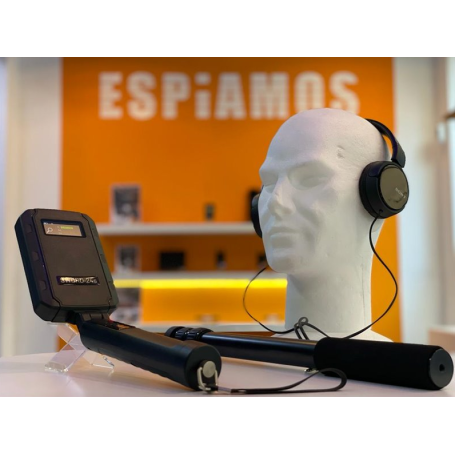
Recommended article: Analysis of the best NJLD detectors
Use of Thermal Cameras
Another useful tool for detecting hidden electronic devices is the use of thermal cameras. All electronic devices generate heat when they are in operation, and thermal cameras can detect these small temperature differences.
However, other electronic components in the car also generate heat, so this method is not foolproof. By combining the use of thermal cameras with other techniques, such as frequency detectors and NJLDs, you will increase your chances of success.
Using Electromagnetic Field Detectors
One of the most innovative methods for detecting hidden devices in a vehicle is the use of electromagnetic field (EMF) detectors. These devices are especially useful for detecting GPS trackers and other electronic equipment, since any electronic device generates an electromagnetic field when operating.
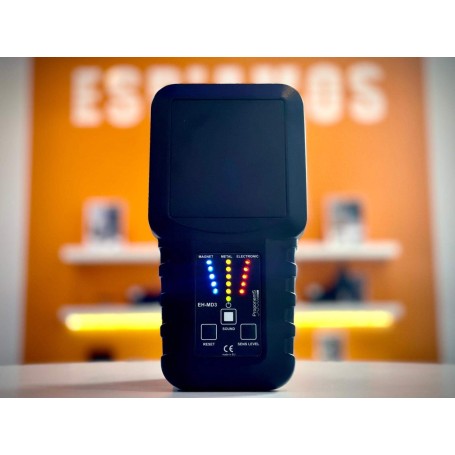
What is an Electromagnetic Field Detector?
An electromagnetic field detector is a device designed to measure fluctuations in electromagnetic fields.EMF fields are emitted by any electronic equipment in operation. Hidden GPS trackers, by emitting communication signals with satellites or mobile networks, generate these fields, which makes it possible to detect them through an EMF detector.
How does an EMF Detector Work in Detecting GPS Trackers?
The EMF detector works by measuring variations in the electromagnetic field around the vehicle. When it detects an anomaly or a strong electromagnetic field, it alerts you to the possible presence of a hidden electronic device. This technology is extremely useful when GPS trackers are installed in places where they are difficult to access visually, such as inside the engine or under the car.
Additionally, EMF detectors can be used in conjunction with other methods, such as frequency detectors or visual inspections, to increase the chances of success in locating hidden devices. Combining multiple detection techniques greatly improves the accuracy of the process and decreases the chances of missing a tracker.
Steps to Follow After Detecting a Hidden GPS Tracker
Once you have managed to detect a hidden GPS tracker in your vehicle, it is important to know how to proceed. The steps you take below can ensure your safety and help you take legal action if necessary.
How to Handle the Found Device
If you find a GPS tracker, it is important not to tamper with it or try to dismantle it. This device could be a key piece of evidence if you decide to file a report with the authorities. Additionally, some trackers may be equipped with self-destruct mechanisms or be monitored in real time.
The found device can be analyzed by professionals who can identify its origin and purpose. In these types of cases, training is essential to know how to act safely.
Inform the Authorities
If you find a GPS tracker in your car and you are not aware of its installation, it is advisable to inform the authorities as soon as possible. This can be a clear sign of an invasion of your privacy or illegal activity. The police may start an investigation to determine the origin of the device and who placed it in your vehicle.
Provide as much information as possible, including when and where you found the device, and any suspicions you have about who may have installed it. Don't hesitate to contact an attorney as well to better understand your rights in this situation.
Legal Considerations
Installing a GPS tracker without the consent of the vehicle owner is illegal in most cases. However, in some countries or situations, law enforcement agencies may have special permission to use these devices for legitimate investigations.
In other cases, placing a GPS tracker on a car without the owner's consent is a clear violation of privacy and can be prosecuted as a crime. If you find yourself in this situation, consult with an attorney to understand your rights and the legal actions you can take.
ESPIAMOS: Your Ally in the Detection of Hidden GPS Devices
ESPIAMOS not only specializes in the sale of counter-surveillance products, but also offers training and advice to ensure that our clients are fully trained to deal with these types of threats. Our approach is based on providing the tools and knowledge necessary for you to act independently and proactively against potential privacy violations.
SPIAMOS Products for GPS Detection
We have a wide range of specialized products for the detection of GPS locators, from frequency detectors to thermal cameras and NJLD detectors. These products are selected and tested by our experts, guaranteeing maximum reliability and effectiveness. In addition, each product comes with full technical support and, in many cases, personalized training for optimal use.
How ESPIAMOS Can Help You Protect Your Privacy
At ESPIAMOS we are committed to protecting your privacy. In addition to offering you the right tools, we provide personalized advice so that you learn how to use them correctly. Our team of experts is always available to help you select the right product and configure and use it.
If you have questions or concerns about detecting GPS locators, we recommend that you contact us. We also offer you the possibility of training in our counter-surveillance techniques, which will allow you to always be one step ahead.
The Support and Training Offered by ESPIAMOS
One of the main differences of ESPIAMOS is our emphasis on training and support. We firmly believe that empowering our clients with knowledge is the best way to protect their privacy. long-term privacy. We offer specialized training in both the use of our products and the detection of electronic threats. Our TSCM Course is one of the most complete on the market and will allow you to detect GPS locators and other surveillance devices in a professional manner.
The Importance of Prevention in the Detection of GPS Locators
Beyond learning how to detect a hidden GPS locator, it is essential to take a preventive approach. At ESPIAMOS, we believe that prevention is one of the best ways to protect your privacy, and that's why we encourage our customers to take a proactive approach to the security of their vehicles and property. Below, we give you some tips on how to prevent the installation of tracking devices.
Keep Your Vehicle Safe and Checked Regularly
A fundamental practice is to keep your car safe and carry out periodic checks. These are not just mechanical checks, but visual inspections in common areas where tracking devices could be installed, such as under the seats, in the glove box or on the exterior chassis. A regular visual inspection will allow you to detect any foreign objects that may have been installed in your vehicle.
Using Preventive Security Products
Nowadays, there are multiple security products that can help you prevent the installation of hidden GPS trackers. Advanced alarm systems, motion detectors, and vehicle security cameras are some of the options you can consider to protect yourself. At ESPIAMOS, we offer cutting-edge technological solutions that help detect tampering attempts on your car, alerting you immediately.
FAQ: Frequently Asked Questions about GPS Tracker Detection
What is a hidden GPS tracker?
A hidden GPS tracker is a tracking device that uses GPS technology to track the location of a vehicle or person without them knowing. Their small size and ability to be hidden in various parts of the vehicle make them difficult to detect without the proper tools.
Where can a GPS tracker be installed in a car?
GPS trackers can be installed both inside and outside the vehicle. Some of the most common locations include under the seats, in the glove box, under the chassis, on the fenders, or inside the engine compartment. They can also be built into devices such as the OBD port in your car.
How can I detect a GPS tracker in my car?
To detect a hidden GPS tracker in your car, you can use a combination of visual inspection and tools such as frequency detectors, non-linear junction detectors (NJLDs), and electromagnetic field (EMF) detectors. These tools will allow you to identify hidden electronic devices that are emitting signals or generating electromagnetic fields.
Is it legal to place a GPS tracker in a vehicle?
The legality of placing a GPS tracker in a vehicle depends on the country and the circumstances.ances. In general, it is illegal to install a tracking device without the consent of the vehicle owner, as it constitutes an invasion of privacy. However, in some circumstances, such as investigations by law enforcement, its use may be authorized.
What should I do if I find a GPS tracker in my car?
If you find a GPS tracker in your car, do not tamper with it or try to disassemble it. It is best to contact the authorities or an attorney to proceed appropriately. If you decide to file a complaint, the device can be important evidence.
How can ESPIAMOS help me detect GPS trackers?
ESPIAMOS offers not only the most advanced detection tools, such as frequency detectors and EMF detectors, but also specialized training so that you can carry out these tasks yourself. In addition, our experts are always available to advise and support you in everything related to the protection of your privacy.
Conclusion: Prevention and Technology at the Service of Your Privacy
Detecting a hidden GPS tracker is not an easy task, but with the right tools and knowledge, it is possible to protect your privacy effectively. At ESPIAMOS, we offer you both the most advanced products on the market and the necessary training so that you yourself can take charge of detecting any suspicious device in your car or property.






 WhatsApp
WhatsApp Telegram
Telegram


